For centuries, tea has been used as a nourishing tonic. Today, many herbal concoctions claim to be the best for your well-being. So how does one know what are the “healthiest teas” to try out. There are many reasons to consider for example, the number of antioxidants, caffeine content, purity, ingredients used, etc.A 19th-century Japanese scholar named Okakura kakuzo stated, “tea began as a medicine and grew into a beverage”. Research has shown that herbal infusions can help with diseases like cancer, autoimmune conditions, mental issues, etc.
 Made from ginger root, ginger tea is an Asian herbal beverage. It has a long history of being used as a medicinal concoction in traditional medicine.It is loaded with vitamin C, magnesium, iron, potassium, phosphate, folate, etc. It is an excellent drink for a cold winter day packed with a lot of health benefits. Try reefresh tea from rhymba hills to taste the rich experience of ginger tea.
Made from ginger root, ginger tea is an Asian herbal beverage. It has a long history of being used as a medicinal concoction in traditional medicine.It is loaded with vitamin C, magnesium, iron, potassium, phosphate, folate, etc. It is an excellent drink for a cold winter day packed with a lot of health benefits. Try reefresh tea from rhymba hills to taste the rich experience of ginger tea. It is an herbal tea made from dried hibiscus flowers. It’s steeped in boiling water and has a pinkish-red color. Hibiscus tea is a refreshing drink having a tart flavor. African nations have used it to decrease body temperature, soothe a sore throat and treat heart diseases. Research shows that it has antibacterial, anticancer, laxative properties. It is high in polyphenols, antioxidants, vitamin C, minerals, etc. Its antioxidant compound help in fighting free radicals which causes cell damage and diseases.
It is an herbal tea made from dried hibiscus flowers. It’s steeped in boiling water and has a pinkish-red color. Hibiscus tea is a refreshing drink having a tart flavor. African nations have used it to decrease body temperature, soothe a sore throat and treat heart diseases. Research shows that it has antibacterial, anticancer, laxative properties. It is high in polyphenols, antioxidants, vitamin C, minerals, etc. Its antioxidant compound help in fighting free radicals which causes cell damage and diseases. Lemongrass herb native to Sri Lanka and South India is a common ingredient in Asian cooking. It is also brewed to make lemongrass tea. It is known for having a number of health and medicinal benefits.Lemongrass is rich in anti-inflammatory compounds like chlorogenic acid, isoorientin, and swertiajaponin.
Lemongrass herb native to Sri Lanka and South India is a common ingredient in Asian cooking. It is also brewed to make lemongrass tea. It is known for having a number of health and medicinal benefits.Lemongrass is rich in anti-inflammatory compounds like chlorogenic acid, isoorientin, and swertiajaponin. An herbal concoction from South Africa, rooibos tea is known for its medicinal purposes. It is prepared from red bush or rooibos plant leaves. It is also known as red tea due to its red color.There is not much scientific research available for its health benefits in modern medicine. But traditional medicine reports a number of health benefits. It is the best caffeine-free tea option.
An herbal concoction from South Africa, rooibos tea is known for its medicinal purposes. It is prepared from red bush or rooibos plant leaves. It is also known as red tea due to its red color.There is not much scientific research available for its health benefits in modern medicine. But traditional medicine reports a number of health benefits. It is the best caffeine-free tea option. Native to Europe and Asia, peppermint is an aromatic herb. It is brewed in boiling water to make peppermint tea. For thousands of years, it has been used for its pleasant, minty taste and health benefits.It is a very refreshing herbal concoction. It has cooling properties due to menthol present in it. It is commonly used to support digestive tract health.
Native to Europe and Asia, peppermint is an aromatic herb. It is brewed in boiling water to make peppermint tea. For thousands of years, it has been used for its pleasant, minty taste and health benefits.It is a very refreshing herbal concoction. It has cooling properties due to menthol present in it. It is commonly used to support digestive tract health. Cinnamon Tea is a beverage with several health benefits. It is made from cinnamon sticks by steeping it in boiling water or grounding it into a powder.It is packed with antioxidants; and contains anti-inflammatory, antibacterial and antifungal properties.
Cinnamon Tea is a beverage with several health benefits. It is made from cinnamon sticks by steeping it in boiling water or grounding it into a powder.It is packed with antioxidants; and contains anti-inflammatory, antibacterial and antifungal properties. A nourishing beverage to drink daily, chamomile infusion has been used for several health conditions. This herb comes from a daisy-like flower and serves as a natural remedy. It is a promising alternative to regular tea. It has a delicious taste and a comforting aroma. It has properties that induce sleep and aid digestion. Drinking this herbal tea is good for you.
A nourishing beverage to drink daily, chamomile infusion has been used for several health conditions. This herb comes from a daisy-like flower and serves as a natural remedy. It is a promising alternative to regular tea. It has a delicious taste and a comforting aroma. It has properties that induce sleep and aid digestion. Drinking this herbal tea is good for you.
List of Healthiest Teas
The tea with the most number of health benefits can be said to be the healthiest. Let’s discover some of them.1. Ginger Tea
 Made from ginger root, ginger tea is an Asian herbal beverage. It has a long history of being used as a medicinal concoction in traditional medicine.It is loaded with vitamin C, magnesium, iron, potassium, phosphate, folate, etc. It is an excellent drink for a cold winter day packed with a lot of health benefits. Try reefresh tea from rhymba hills to taste the rich experience of ginger tea.
Made from ginger root, ginger tea is an Asian herbal beverage. It has a long history of being used as a medicinal concoction in traditional medicine.It is loaded with vitamin C, magnesium, iron, potassium, phosphate, folate, etc. It is an excellent drink for a cold winter day packed with a lot of health benefits. Try reefresh tea from rhymba hills to taste the rich experience of ginger tea.Benefits:
- Aids in digestion: Ginger being a superfood helps the digestive system in it’s working. Ginger tea provides relief to people who feel bloated, have acidity issues and poor digestion.
- Helps with nausea: If you have ginger tea before traveling, it will help you deal with motion sickness and nausea.
- Anti-inflammatory: Ginger has anti-inflammatory properties that help control the inflammation anywhere in the body. Ginger tea is often used as a home remedy for arthritis and joint pain.
- Improves blood circulation: The vitamins, minerals and amino acids found in ginger tea are known to aid blood circulation. This helps reduce the risk of cardiovascular problems.
- Strengthens immunity: Its high level of antioxidants boosts the immune system.
- Relieves stress: With it’s calming properties, it helps relieve stress and tension.
- Helps deal with menstrual cramps.
- It helps relieve chest congestion and the common cold.
2. Hibiscus Tea
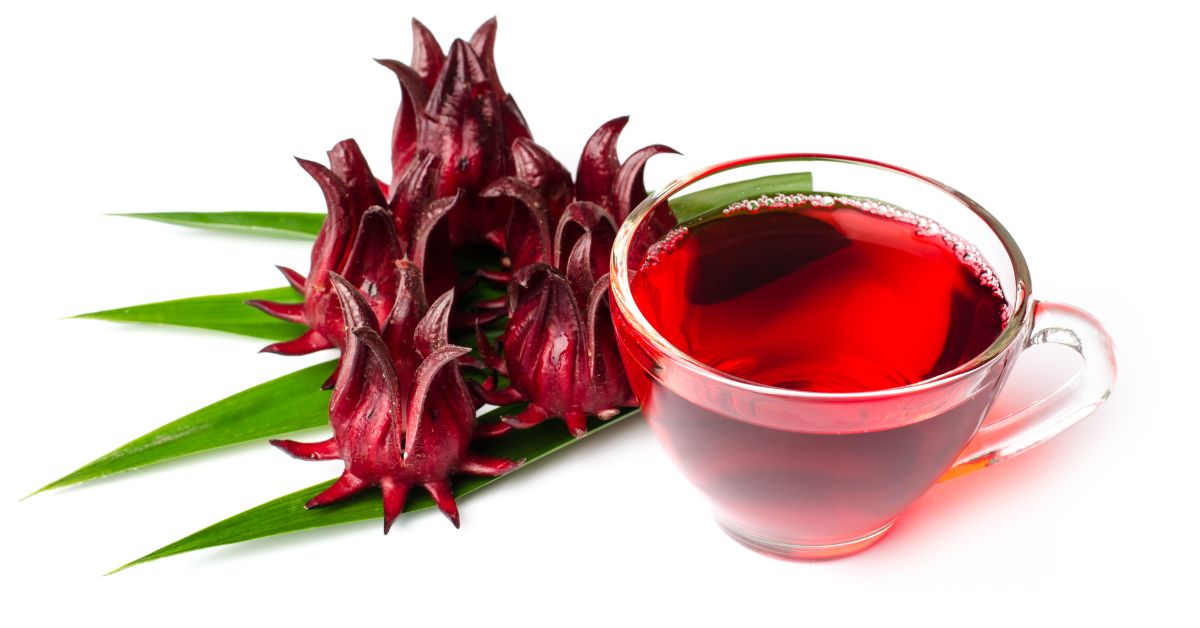 It is an herbal tea made from dried hibiscus flowers. It’s steeped in boiling water and has a pinkish-red color. Hibiscus tea is a refreshing drink having a tart flavor. African nations have used it to decrease body temperature, soothe a sore throat and treat heart diseases. Research shows that it has antibacterial, anticancer, laxative properties. It is high in polyphenols, antioxidants, vitamin C, minerals, etc. Its antioxidant compound help in fighting free radicals which causes cell damage and diseases.
It is an herbal tea made from dried hibiscus flowers. It’s steeped in boiling water and has a pinkish-red color. Hibiscus tea is a refreshing drink having a tart flavor. African nations have used it to decrease body temperature, soothe a sore throat and treat heart diseases. Research shows that it has antibacterial, anticancer, laxative properties. It is high in polyphenols, antioxidants, vitamin C, minerals, etc. Its antioxidant compound help in fighting free radicals which causes cell damage and diseases.Benefits
- Helps with heart diseases: As per a study, hibiscus tea could effectively lower the blood cholesterol and triglyceride levels. It promotes good HDL cholesterol and reduces bad LDL cholesterol. It can help prevent several coronary diseases if taken daily.
- Lowers blood pressure: Hibiscus tea is found to decrease both systolic and diastolic blood pressure. So it may help people with blood pressure issues.
- Aid weight loss: A study found including hibiscus tea in your daily diet helped reduce obesity. It helps fight inflammation which causes loss of water weight thus helping in weight-loss. It is a healthy tea for weight loss.
- Improves digestion.
- Prevent hypertension.
- Help with depression.
- It helps fight bacteria.
3. Lemongrass Tea
 Lemongrass herb native to Sri Lanka and South India is a common ingredient in Asian cooking. It is also brewed to make lemongrass tea. It is known for having a number of health and medicinal benefits.Lemongrass is rich in anti-inflammatory compounds like chlorogenic acid, isoorientin, and swertiajaponin.
Lemongrass herb native to Sri Lanka and South India is a common ingredient in Asian cooking. It is also brewed to make lemongrass tea. It is known for having a number of health and medicinal benefits.Lemongrass is rich in anti-inflammatory compounds like chlorogenic acid, isoorientin, and swertiajaponin.Benefits
- Relieving anxiety: Sipping a cup of hot lemongrass tea has an anxiety-reducing effect.
- Lowers cholesterol levels: A study published in the Journal of Advanced Pharmaceutical Technology and Research showed lemongrass consumption appeared to lower the cholesterol in animals.
- Preventing infection: Lemongrass tea can help fight infection. For example, the herb seems to reduce fungal infection in those who have weakened immune system.
- Good for oral health: Chewing on lemongrass improves dental health.
- Boosts red blood cell levels: The herbal infusion increases hemoglobin concentration and red blood cell count if consumed daily for 30 days.
- Helps with bloating: With its diuretic effects, lemongrass tea aids kidney stimulation to release more urine than usual.
- Pain reliever.
4. Rooibos Tea
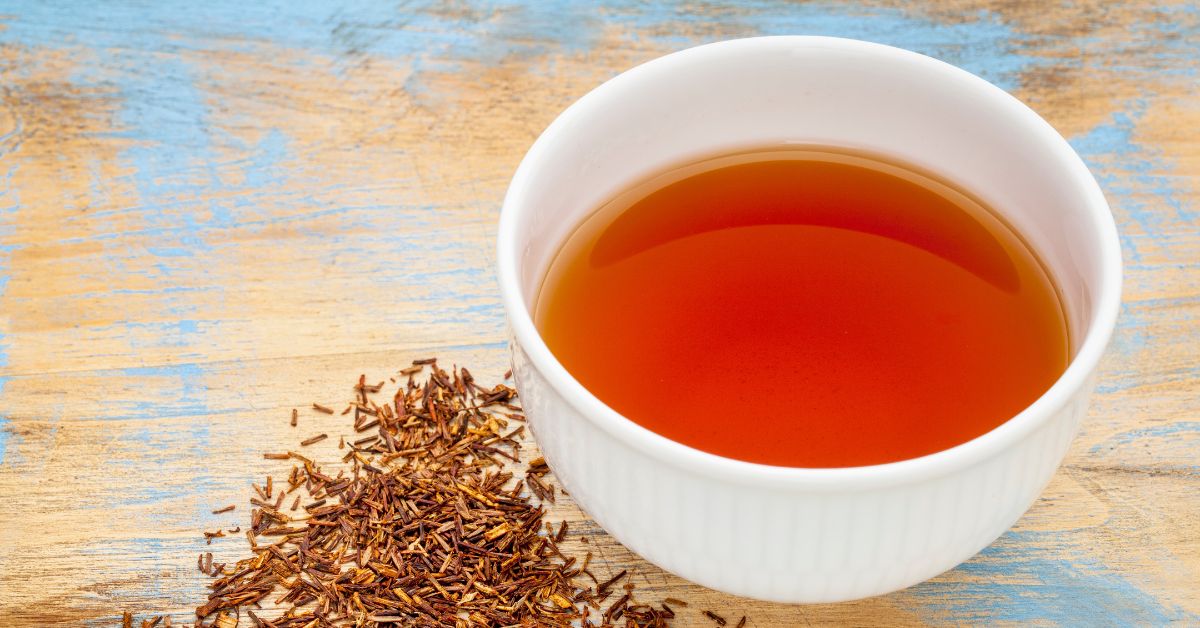 An herbal concoction from South Africa, rooibos tea is known for its medicinal purposes. It is prepared from red bush or rooibos plant leaves. It is also known as red tea due to its red color.There is not much scientific research available for its health benefits in modern medicine. But traditional medicine reports a number of health benefits. It is the best caffeine-free tea option.
An herbal concoction from South Africa, rooibos tea is known for its medicinal purposes. It is prepared from red bush or rooibos plant leaves. It is also known as red tea due to its red color.There is not much scientific research available for its health benefits in modern medicine. But traditional medicine reports a number of health benefits. It is the best caffeine-free tea option.Benefits
- Good for bone health: It is known to stimulate the cells involved in bone growth and density.
- Anti-inflammatory: It helps lower inflammation and cell toxicity.
- Prevent heart disease: Rooibos tea inhibits the enzyme that causes blood vessels to constrict which may help prevent heart disease. Drinking this tea for 6 weeks can lower bad cholesterol (LDL) and fat.
- Good for autoimmune conditions: It can help people suffering from autoimmune diseases like rheumatoid arthritis, etc. It is a caffeine-free beverage that is safe for autoimmune conditions.
5. Peppermint Tea
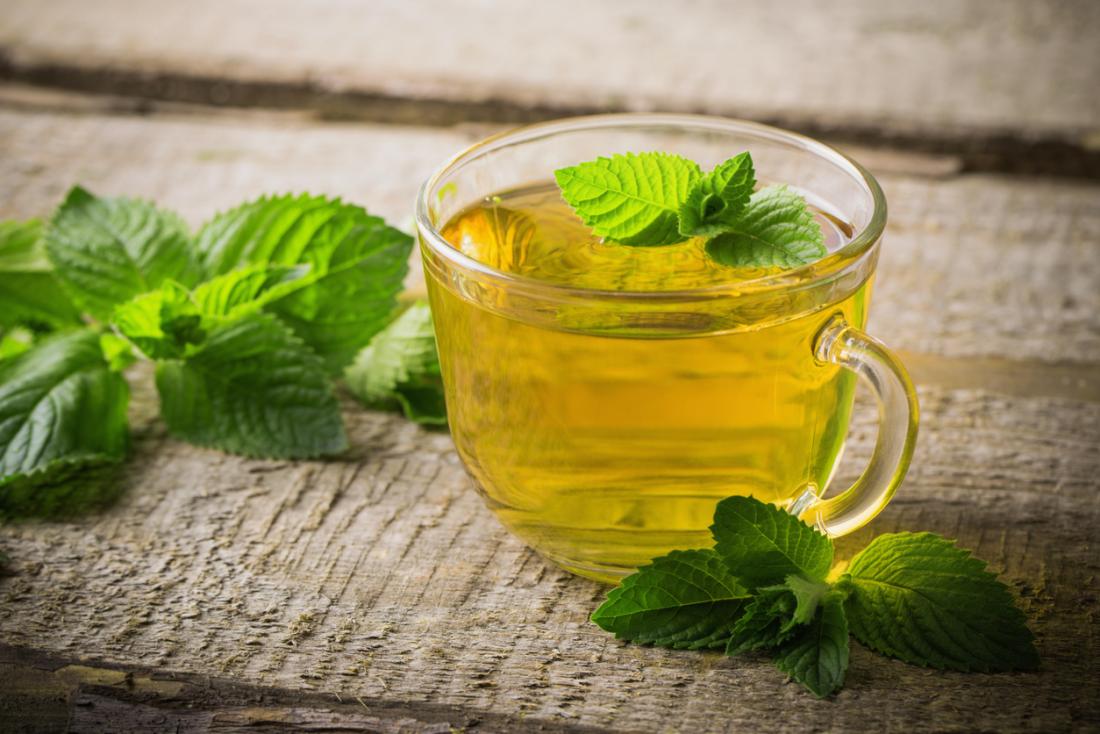 Native to Europe and Asia, peppermint is an aromatic herb. It is brewed in boiling water to make peppermint tea. For thousands of years, it has been used for its pleasant, minty taste and health benefits.It is a very refreshing herbal concoction. It has cooling properties due to menthol present in it. It is commonly used to support digestive tract health.
Native to Europe and Asia, peppermint is an aromatic herb. It is brewed in boiling water to make peppermint tea. For thousands of years, it has been used for its pleasant, minty taste and health benefits.It is a very refreshing herbal concoction. It has cooling properties due to menthol present in it. It is commonly used to support digestive tract health.Benefits
- Relieves indigestion and bloating: Studies indicate that it relaxes the digestive system and ease the pain. It prevents smooth muscles from contracting, relieving spasms in the gut. It also provides significant relief to those who suffer from irritable bowel syndrome (IBS).
- Provides relief from headaches, migraines, and tension: Its muscle relaxant properties help diminish certain types of headaches. Menthol increases blood flow thereby providing a cooling effect which helps ease the pain.
- Freshen your breath: The antibacterial properties makes it a good choice for maintaining oral health. It helps kills germs that cause dental plaque and improves breath.
- Reduce fatigue: Peppermint tea improves energy levels. The natural compounds in it have beneficial effects on energy and thus reduce fatigue.
- Improves your sleep: It is an ideal beverage for those who struggle with sleep at night. Being naturally caffeine-free, it induces sleep by relaxing the muscles.
- Improves seasonal allergies: It contains rosmarinic acid which is linked to reducing allergic reaction symptoms. It can help with a runny nose, itchy eyes, and asthma.
- Improves concentration: It helps improve memory and alertness.
6. Cinnamon Tea
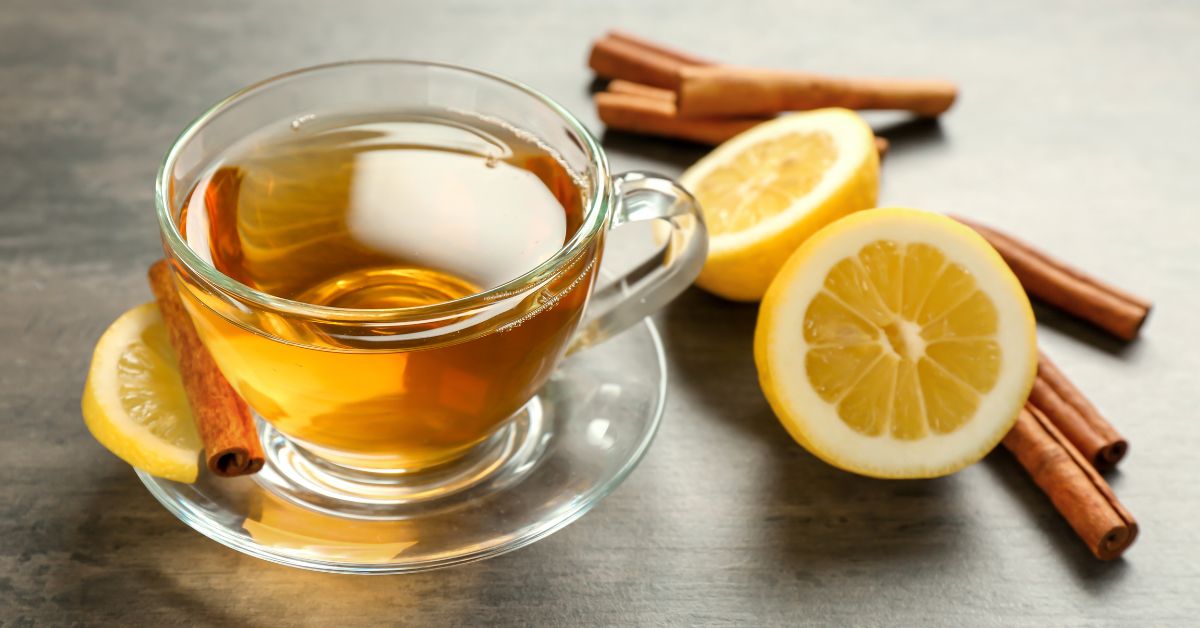 Cinnamon Tea is a beverage with several health benefits. It is made from cinnamon sticks by steeping it in boiling water or grounding it into a powder.It is packed with antioxidants; and contains anti-inflammatory, antibacterial and antifungal properties.
Cinnamon Tea is a beverage with several health benefits. It is made from cinnamon sticks by steeping it in boiling water or grounding it into a powder.It is packed with antioxidants; and contains anti-inflammatory, antibacterial and antifungal properties.Benefits
- Helps with weight loss: Several studies have shown intake of cinnamon has aided fat loss. But it’s consumption in excess can have a worse effect on the liver. So it should be taken only in moderate limits.
- Manage blood sugar levels: Cinnamon spice appears to act in a manner similar to that of insulin. Its antidiabetic effects help lower blood sugar levels.
- Helps with oral health: Its antibacterial and antifungal properties help reduce bad breath and prevent tooth decay.
- Fights free radicals: Its antioxidant compound helps control oxidation caused by free radicals. Thus, it helps you stay healthy.
- It may reduce menstrual cramps and other PMS symptoms.
- Reduce acne and fight skin aging.
- It may help preserve brain function.
7. Chamomile Tea
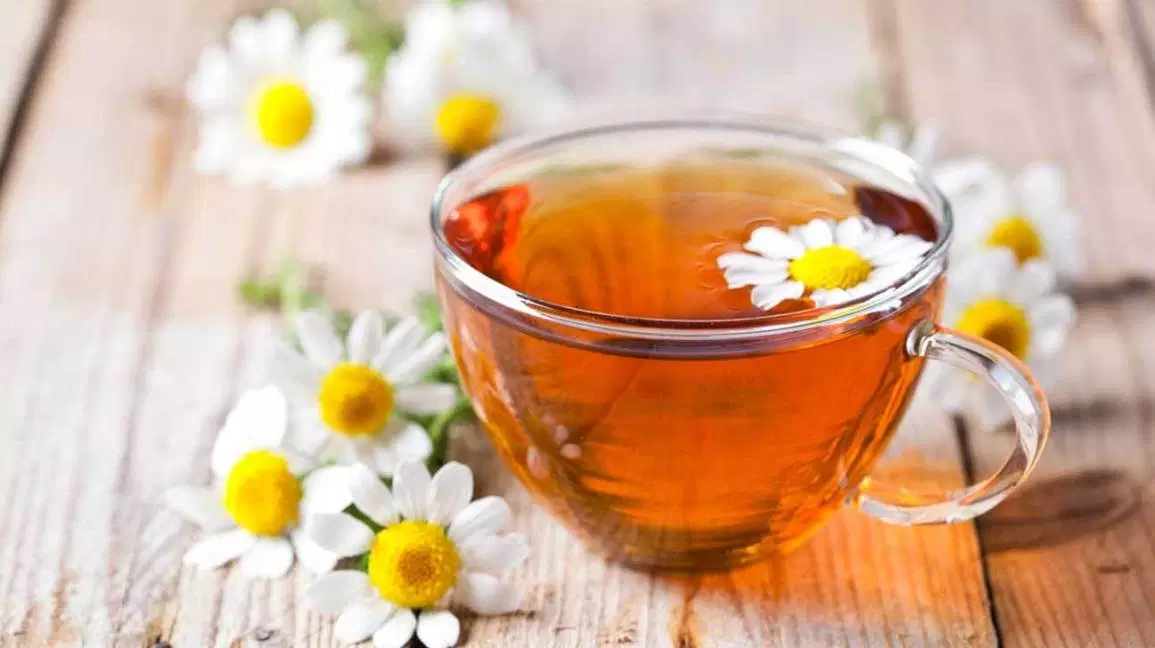 A nourishing beverage to drink daily, chamomile infusion has been used for several health conditions. This herb comes from a daisy-like flower and serves as a natural remedy. It is a promising alternative to regular tea. It has a delicious taste and a comforting aroma. It has properties that induce sleep and aid digestion. Drinking this herbal tea is good for you.
A nourishing beverage to drink daily, chamomile infusion has been used for several health conditions. This herb comes from a daisy-like flower and serves as a natural remedy. It is a promising alternative to regular tea. It has a delicious taste and a comforting aroma. It has properties that induce sleep and aid digestion. Drinking this herbal tea is good for you.Benefits
- Promotes digestive health: Chamomile extract has the potential to protect against diarrhea. It is helpful in preventing stomach ulcers by reducing acidity.
- Benefit blood sugar control: It has anti-inflammatory properties that prevents damage of pancreas cells. Scientific evidence suggests that chamomile tea may lower fasting blood sugar levels.
- Improves sleep quality: The antioxidant, apigenin, found in, it is known to induce sleep. Apigenin binds certain receptors in the brain. So it helps reduce insomnia.
- Improve heart health: The herbal infusion is rich in flavones, a class of antioxidants. It has the potential to lower blood pressure and cholesterol levels.
- Boosts immune health: Chamomile hot tea is used to treat common cold. It is also soothing for sore throat.
- Good for skin: Studies suggests that chamomile reduces inflammation. Thus applying it to your skin can be beneficial.
- Prevent bone loss: It is claimed that chamomile tea might prevent bone loss that leads to osteoporosis. But the evidence is not strong enough
Final Thoughts
Teas have been an important part of various societies and cultures since ancient times. The herbal concoctions were developed for medicinal purposes. Today these come in a variety of flavors with added health benefits. Modern medicine has also begun to validate its usage.Whether you are a tea lover or not, trying out these healthiest teas will definitely prove to be good for you.Rhymba Hills Botanical Infusion x Jadi Batek Clutch Pouch (Visit Malaysia Year 2026)
GiftsRM65.00Original price was: RM65.00.RM60.00Current price is: RM60.00.Rated 0 out of 5Chinese New Year 2026 Money Pouch Set A
GiftsRM95.00Original price was: RM95.00.RM88.00Current price is: RM88.00.Rated 0 out of 5Chinese New Year 2026 Money Pouch Set B
GiftsRM135.00Original price was: RM135.00.RM128.00Current price is: RM128.00.Rated 0 out of 5Christmas Box 2025
GiftsRM120.00Original price was: RM120.00.RM99.00Current price is: RM99.00.Rated 0 out of 5

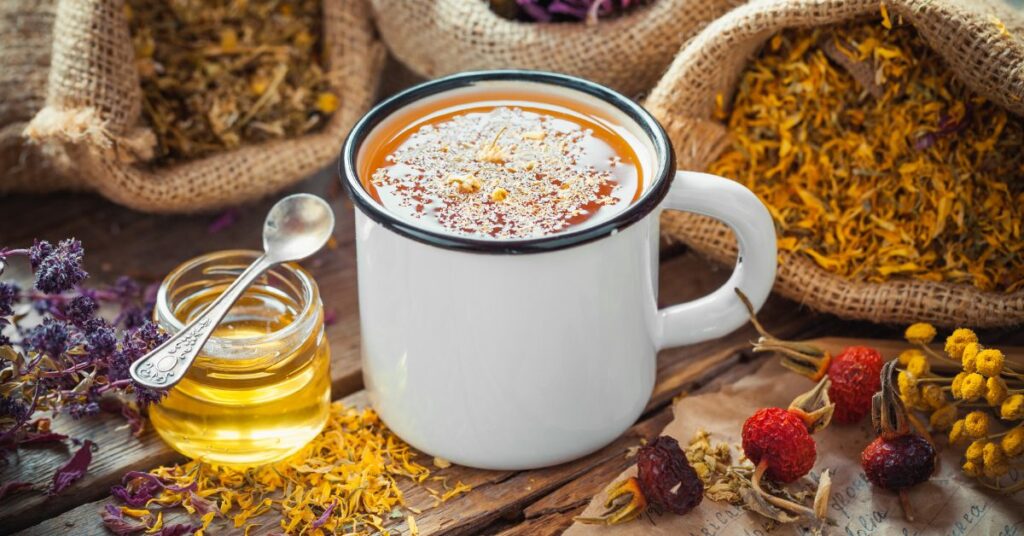
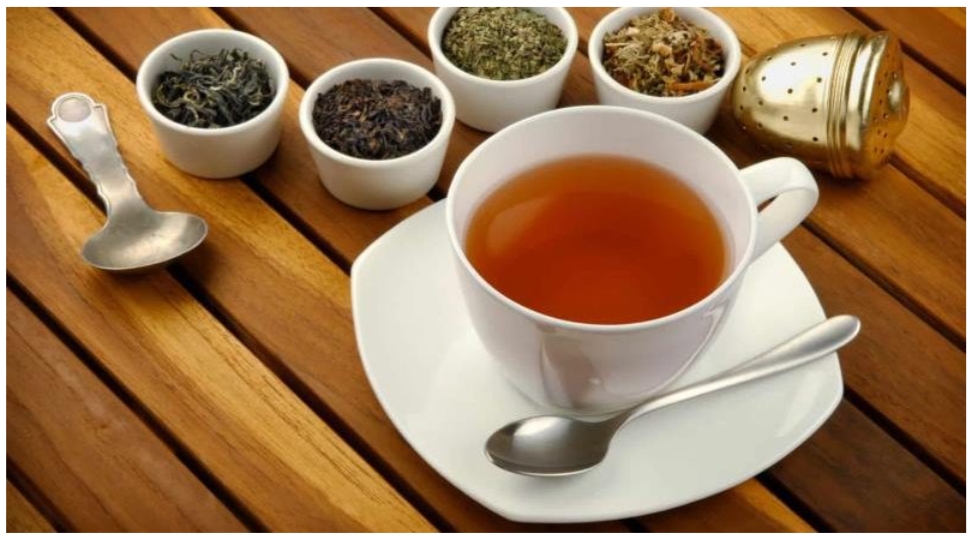

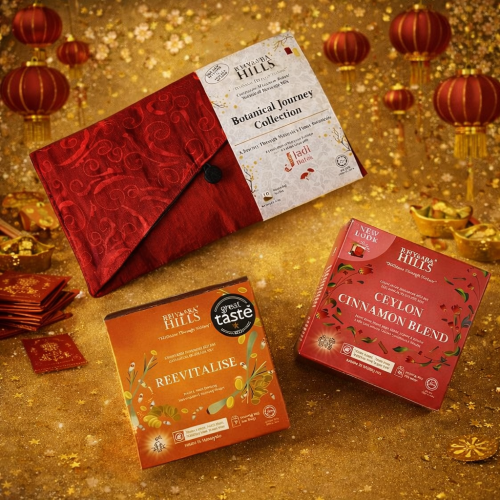
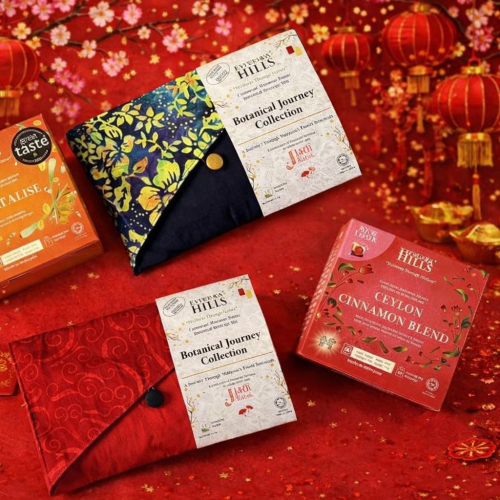
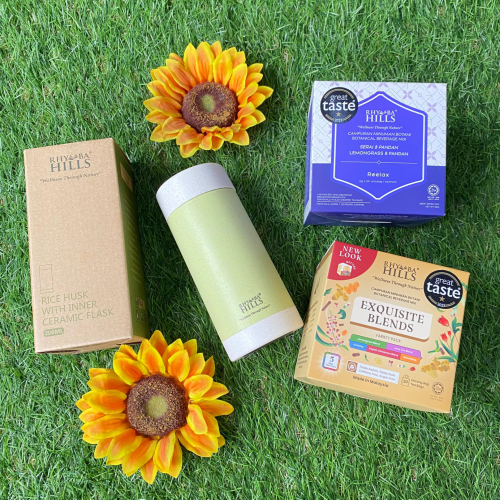



Your website’s layout and writing style are both really impressive. With all the experimenting I’ve done, do you have any advice or suggestions?
Such a very useful article. Very interesting to read this article.I would like to thank you for the efforts you had made for writing this awesome article
punk rock outfits